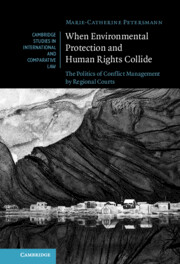 When Environmental Protection and Human Rights Collide
When Environmental Protection and Human Rights Collide from Part II - Conflict Mediation through Universalisation
Published online by Cambridge University Press: 20 October 2022
This chapter turns to the second ‘universalisation strategy’ developed by courts to conceal legal indeterminacy when environmental protection and human rights collide. It shows how courts rely on the authority and supposed objectivity of experts when interpreting conflicts and justifying their decisions. The argument unfolds in two parts. The first part analyses the role played by scientific experts in cases decided by the Court of Justice of the European Union. It critically assesses this expert-based managerial approach to conflict adjudication and highlights the risk of obstructing the protection of certain rights that do not fit a particular epistemic framework. The second part analyses the role played by specialised human rights experts in regional human rights courts in cases concerning Indigenous peoples and cultural minorities. A network of experts with particular institutional ties gets involved in such cases. These experts share a specific (legal) vocabulary and imaginary when speaking on behalf of the applicants, which courts replicate through cross-jurisdictional and cross-cultural referencing. This essentialises certain ways of living determined by artificial binaries of ‘traditional’ versus ‘modern’. What emerges is an empirically rich understanding of regional human rights courts’ reliance on specialised expertise with both bright and dark sides.
To save this book to your Kindle, first ensure [email protected] is added to your Approved Personal Document E-mail List under your Personal Document Settings on the Manage Your Content and Devices page of your Amazon account. Then enter the ‘name’ part of your Kindle email address below. Find out more about saving to your Kindle.
Note you can select to save to either the @free.kindle.com or @kindle.com variations. ‘@free.kindle.com’ emails are free but can only be saved to your device when it is connected to wi-fi. ‘@kindle.com’ emails can be delivered even when you are not connected to wi-fi, but note that service fees apply.
Find out more about the Kindle Personal Document Service.
To save content items to your account, please confirm that you agree to abide by our usage policies. If this is the first time you use this feature, you will be asked to authorise Cambridge Core to connect with your account. Find out more about saving content to Dropbox.
To save content items to your account, please confirm that you agree to abide by our usage policies. If this is the first time you use this feature, you will be asked to authorise Cambridge Core to connect with your account. Find out more about saving content to Google Drive.